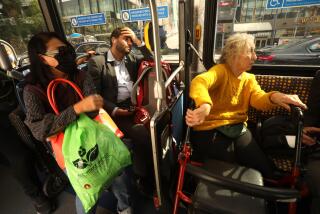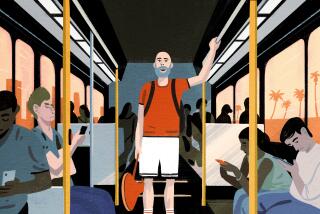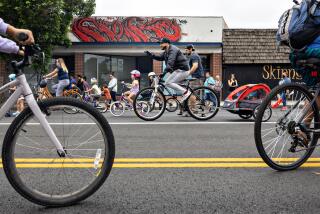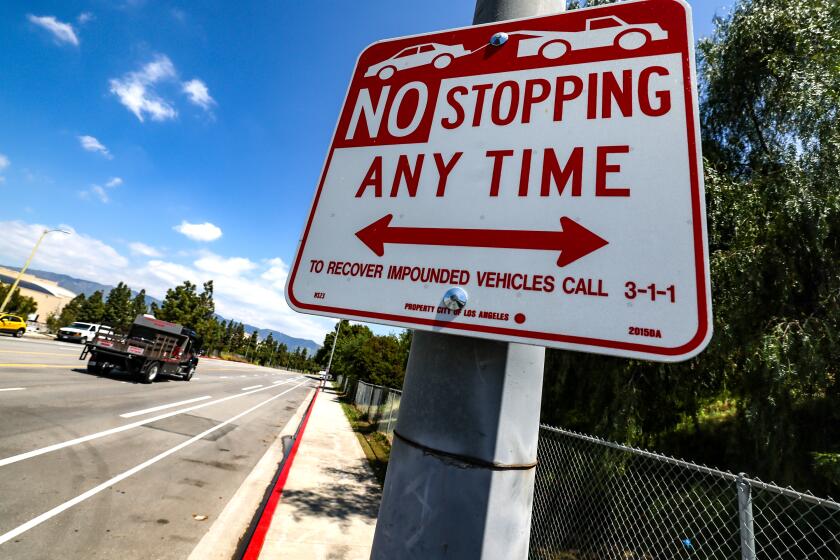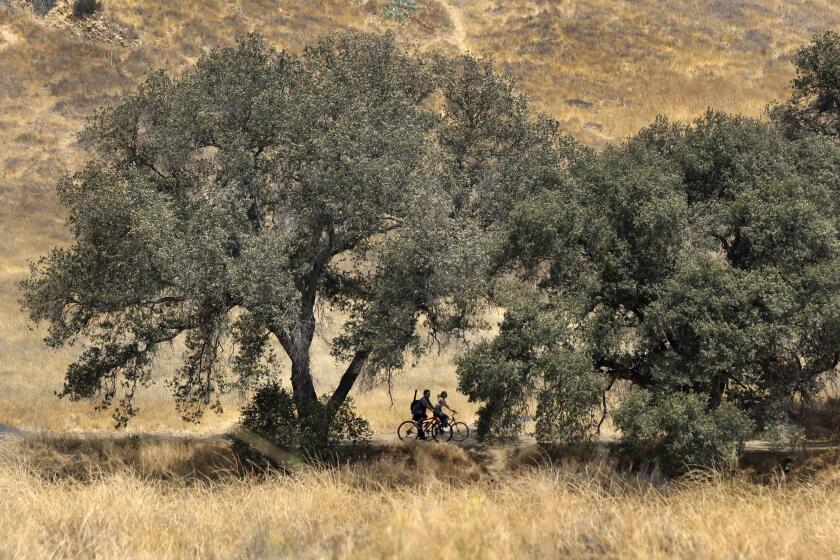Column: Inside L.A.’s other cycling world — no helmet, no cars and not much money for repairs
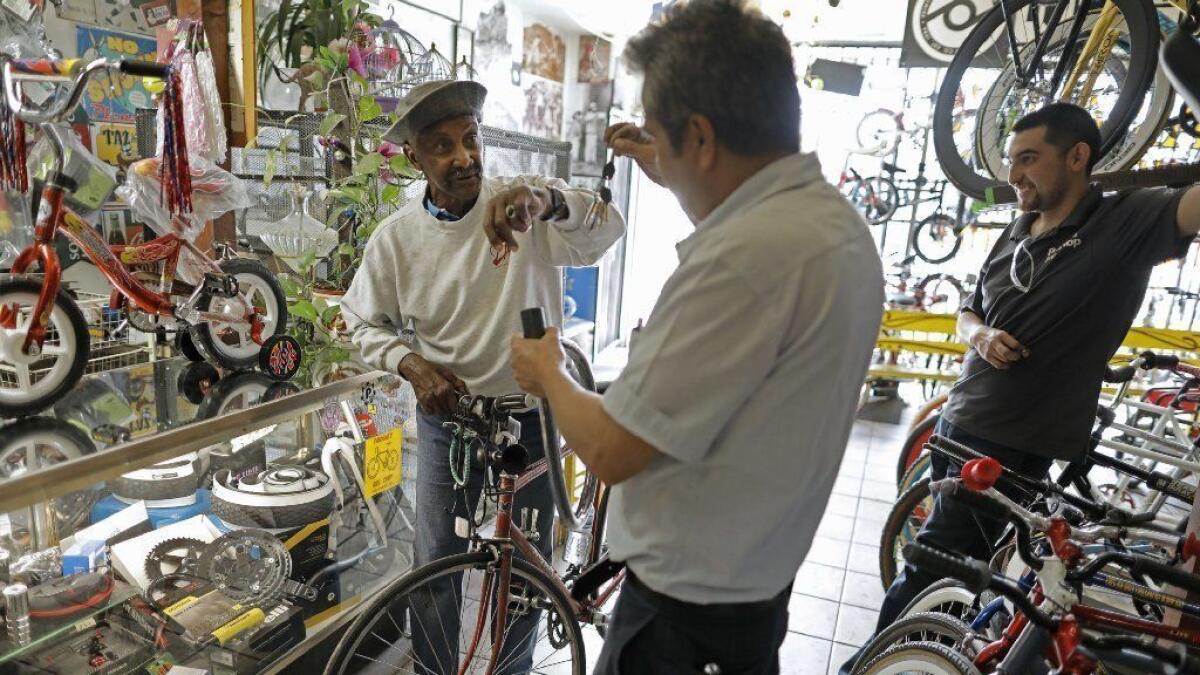
Earl Garrett, 79, stopped by Paisano’s Bike Shop in South Los Angeles last week to get a new lock for a red two-wheeler that’s also a veteran soldier of the streets.
The Watts resident told me he hasn’t had a car since 1970 and uses his bike for work, like thousands of others in Los Angeles.
“What do you do?” I asked.
“Wash windows,” Garrett said, telling me he has traveled as far as Santa Monica for work. “I put the squeegee right here. I put the bucket right there.”
And what did Garrett do before he washed windows?
“Washed windows,” Garrett said, waiting for me to laugh.
I roamed South Los Angeles for a few days last week, trying to get a good read on the bike culture, and I ended up learning a lot about the local economy.
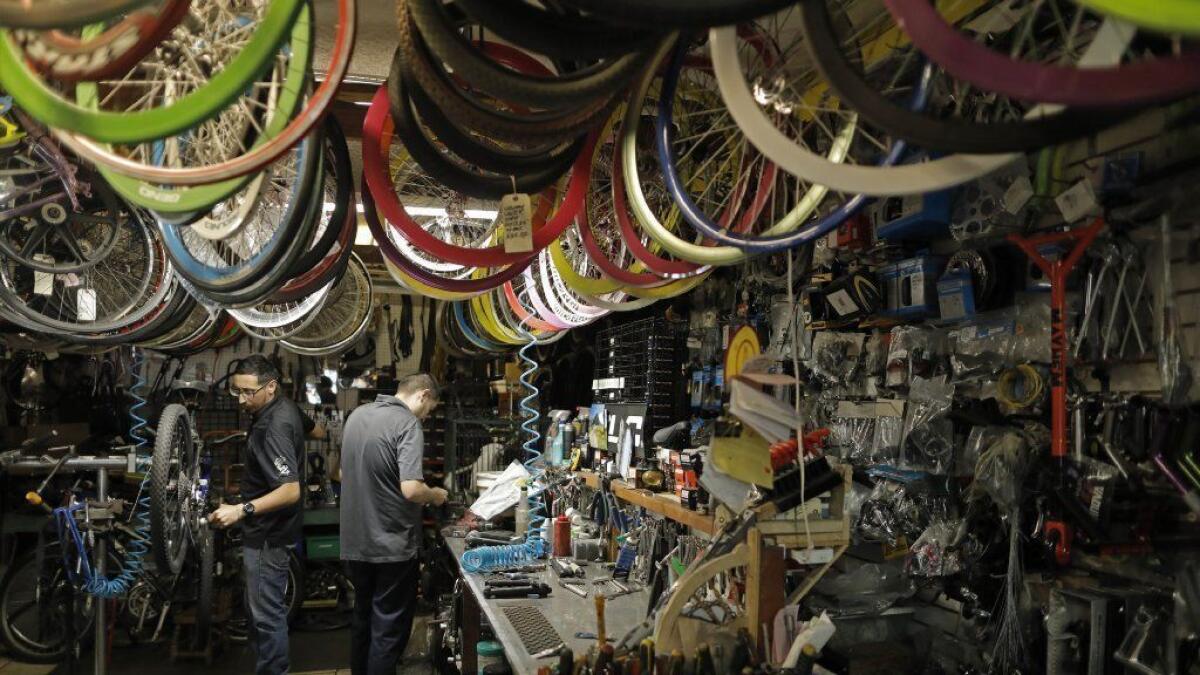
Bikes are everywhere on the south side. Although cycling is dangerous — two more people were struck and killed by motorists in recent days in South L.A. — it’s the least expensive way to get around. No matter the time of day or night, you see people traveling not for recreation, but out of necessity, often without helmets and the Popsicle-colored spandex you see in areas where cycling is often sport, not last resort.
You see cyclists in the uniforms of medical aides, dishwashers, construction workers.
You see cyclists balancing groceries and you see lots of students.
And you see lots of places selling bikes — often of the used variety.
Paisano’s is at Vernon Avenue and Main Street. It’s one of three shops in a three-block area along with La Cadena and Linares, with several more stores nearby. At 65th and Avalon, a man sits on an office chair in his frontyard, selling used cruisers for $50. On Broadway, across from Linares Bike Shop, a man living in a car offered to sell me a bike for $80.
Partly because of the glut, business is slow, according to several bike shop owners I spoke to, including Eliseo Tejada Lopez of Paisano’s. He typically sells only a few bikes a month, and relies instead on repairs and accessories.
“You see these bikes right here?” the 65-year-old owner said, pointing to a row of new bicycles hanging from the ceiling in his front window. “One year, they’ve been there. Maybe two.”
Thousands of working people in Los Angeles toil in a low-wage economy, and bikes that go for $300 and up don’t fit neatly into family budgets. A customer named Clarice Hernandez, 31, came into Paisano’s to get some air in her back tire, and she offered another explanation for slow sales of new bikes.
“I had four bikes stolen,” she said, including the time she and her boyfriend were sitting in a park with their bicycles when a man and woman approached with a shotgun.
“It was the first time I ever had a gun pointed to my face,” said Hernandez, who commutes by bike to Los Angeles Trade Tech College, where she’s studying culinary arts.
Fear of theft — and below-market resale of hot bikes on the street — isn’t the only challenge for bike shops.
They have to compete with one another, as well as with the internet and big-box discounts. And then there’s Metro Bike Share, which has various locations — including a few south of the 10 Freeway — where you can get a bike for free for a half an hour, and $3.50 for every half-hour thereafter.
And now, thanks to the continued spread of homelessness throughout Los Angeles, there’s a new competitor when it comes to bike sales and repairs.
“You can go to the homeless and get a bike for $10,” said Tejada Lopez’s son, Abraham, who works at Paisano’s along with his brother, Eliseo Jr.
Some customers will come by for repair of a rim or some-such, and when they hear the price might be $20 or $30, they’ll walk away grumbling that they can find someone on the street to do it for $5.
Amateur repairs can backfire, though. Abraham showed me his collection of industrious but ultimately failed attempts to fix flats — with materials including balloons, plastic wrap, tape and air conditioning hose. At some point, you have to buy a new tube, and Paisano’s has what you need.
Moments after Abraham laid this out, a young man came in to pump air into the back tire on an old Schwinn. He said he goes by the name of Miller, and that he’s homeless in the neighborhood, where he repairs bikes for a living. He said he can get parts on the street, fix just about anything, and offer low prices.
Tejada Lopez and his sons gave me a look that said, “Like we were saying.”
Just north of their shop, where Main Street and Broadway Place come together, I saw homeless encampments and lots of bicycles. To the south, along Grand Avenue where it butts up against the east side of the 110 Freeway, a mini-skid row stretches for blocks, and there are dozens of bikes around.
A young guy with a wrench was working on an upside-down bicycle outside a green tent. I asked if he could repair any bike problem I might bring to him.
He took the cigarette out of his mouth and said sure, no problem.
I kept circling back to Paisano’s because of the cast of characters who walked in the door, and because in a city of a million mom-and-pop enterprises, here was one more spirited attempt to scratch out a living.
Tejada Lopez said he worked seven days a week at an Eastside textile plant for almost 20 years, and when it shut down he wanted to have his own business. He sold bikes at 52nd and Compton the first 10 years, then moved to the current location a decade ago.
He got off to a rough start when he hired someone to hand out fliers announcing Paisano’s arrival. Some of the leaflets were posted in public places, and the city fined him $950. After he paid up, he got slapped with an additional $1,500 in fines, but beat the fines at City Hall by pleading that he doesn’t make that kind of money.
“Do you notice anything I might do to improve my shop?” Tejada Lopez asked me.
It already looked great to me. Caged birds sang, fish tanks gurgled and two cats roamed a shop where Pancho Villa shares a wall with Nelson Mandela and Dr. Martin Luther King Jr.. Tejada Lopez said Paisano’s seemed like a good name to him, because he wanted customers, regardless of skin color, to feel like his countrymen.
Abraham and Eliseo Jr. have some college behind them, and they’re scheming to expand the shop’s social media outreach. They also want to design and sell custom Paisano’s gear, and they’re thinking of adding bike rentals.
Tejada Lopez told me he suspects his sons are hanging around to make it easier for him to slow down when that day comes.
When business is slow, Tejada Lopez said, he and his sons go without pay. But he knows things will pick up, then slow down again. You just keep pedaling. And seeing an old friend and longtime customer like the window washer can make Tejada Lopez’s day.
“Sometimes if there’s no business, I go home laughing. My wife says, ‘What happened today?’ I tell her, ‘People came in and told me stories, I feel relaxed and it’s OK.’ And she says, ‘Where’s the money?’
“I tell her, ‘No money today. Maybe tomorrow.’”
Get more of Steve Lopez’s work and follow him on Twitter @LATstevelopez
More to Read
Start your day right
Sign up for Essential California for news, features and recommendations from the L.A. Times and beyond in your inbox six days a week.
You may occasionally receive promotional content from the Los Angeles Times.

